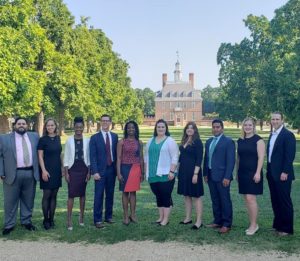A Humanist and a Baptist Walk through Colonial Williamsburg…
 2019 Fellows of the Baptist Joint Committee for Religious Liberty (photo via BJC on Instagram)
2019 Fellows of the Baptist Joint Committee for Religious Liberty (photo via BJC on Instagram) Last week, I participated in the Fellows Program of the Baptist Joint Committee for Religious Liberty (BJC), a national group working in courtrooms and on Capitol Hill to protect the right for all Americans to follow their spiritual beliefs—or lack thereof. Since 2015, the BJC has brought together ten early-career religious liberty advocates in Williamsburg, Virginia, to expand upon their knowledge of the historical, theological, and legal underpinnings of that very American right.
After an introductory session late Wednesday, I and the nine other 2019 fellows jumped feet-first into three full days of tours, seminars, workshops, and lectures. Thursday focused nearly exclusively on the religious (specifically Baptist) understanding of what it means to protect the freedom of and from religion. As someone who grew up nonreligious in the Bible Belt, I’ve always felt an intrinsic need to protect my right to disagree with the majority faith tradition of a broader community. However, I wouldn’t say that I had many interfaith allies in that battle throughout my adolescence. That personal history made the experience of sharing community with devout worshippers who value the same freedom I do extraordinarily impactful to my work. The stories of early Baptists who were harassed and even jailed for practicing their faith were combined with tours of the very jails that would have been used for that purpose in Colonial Williamsburg, driving home just how daunting that fight must have been.
On Friday we discussed the US Constitution and the First Amendment in great detail. This included an assessment of the Supreme Court decision on the Bladensburg cross case (brought by the American Humanist Association), one of the most recent indications that we cannot trust the Founders’ separation of church and state to the high court alone. We also learned more about Project Blitz, a Christian nationalist campaign to attack equality in state legislatures across the country. In response to these practices, a joint coalition recently launched BlitzWatch, a national, coordinated effort to protect religious freedom and equality for all Americans.
By the time we got to Saturday’s sessions on advocacy and national strategy, the ten 2019 BJC fellows were fast friends. As it turns out, evenings spent debating the role of theology in partisan politics over a glass of wine will bring even the unlikely together. Staff from the BJC trained the room on best practices for legislative advocacy, and we shared reflections on the weekend. The group also discussed the ongoing battle around religious exemptions. Here at the American Humanist Association, we know that the right to one’s religious belief does not excuse blatant discrimination and bigotry. Taxpayer-funded foster agencies cannot turn away potential parents because of their religious traditions. Calligraphers cannot refuse to complete wedding invitations purely because the engaged are gay. Religious freedom is not discrimination. It’s heartening to see our religious allies joining us in this fight to protect the marginalized.
Threaded throughout the weekend were the lessons of two of the assigned texts. The author of Endowed by Our Creator: The Birth of Religious Freedom in America (2012), Professor Michael Myerson, joined us for a book talk and answered many of our questions about the Founders’ views of religious liberty and the early advocacy that laid the foundations of today’s work. The second selection, Pulpit & Politics: Separation of Church and State in the Black Church (2014) by Marvin A. McMickle, featured prominently in our conversations, both formal and informal, about the role of race in the fight for religious liberty. These ideas of marginalization are inextricably linked, as are the philosophies of white nationalism and Christian nationalism. Conversations about racial inequity took a new seriousness in Colonial Williamsburg, where 50 percent of the population was enslaved.
Of the ten fellows this year, and the fifty in total who have worked through the program, I may be the only nonreligious person to participate. At the very least, I’m the only open humanist. It was thrilling to experience the mix of interfaith advocates who are concerned and working on many of the same issues that we in the secular movement are focused on. As large as our community is, and as passionate as we are, we cannot be alone in this fight. We need Christians to join us in opposing Christian nationalism, a fight that BJC officially linked themselves to just this Monday.
As a high-schooler, I often tried to stand up against what I saw as inappropriate encroachments of the church into my public school. I cannot imagine the confidence it would have given me (and the greater impact it would have had) to have a Christian ally stand next to me, asking for faith freedom for all. I hope more religious leaders and representatives join us and our allies at organizations like BJC in fighting back against the distortion of religious freedom and the restriction of all but a select few faiths. For our nonreligious readers, please take this as a reminder that we can join hands with our faith allies to create greater, more powerful change.
Last week, a humanist and her fellow Baptist Joint Committee Fellows walked through Colonial Williamsburg and arrived at a greater understanding of each other and a new set of tools to aid in the fight for true religious freedom.
